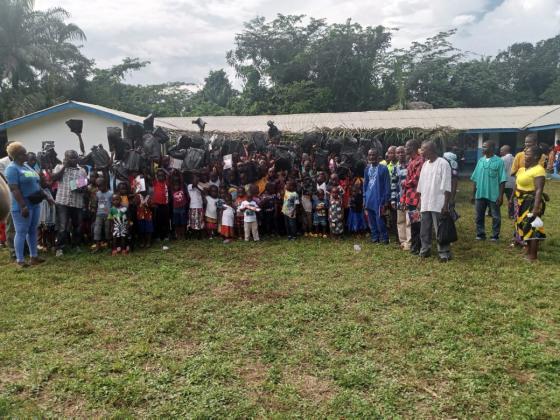Liberia: Dobli-Ta Community School Reopens After Being Closed Since Ebola

Parents, students and teachers celebrate the restoration of Dobli-Ta Community School, Fuamah District, Bong County, on October 2, 2023.
The parents and students of Dobli-Ta Community School, which was closed during the Ebola epidemic in 2014 and had not been reopened since, have about 300 reasons to smile.
Established in 1964 to provide educational opportunities to hundreds of school-going kids from kindergarten to the fourth grade, the school had become dilapidated over the course of the post-Ebola years due to lack of funding for its upkeep.
So it was a great celebration when hundreds of students, parents, and educators from four towns in Yarbayon Clan, Fuamah District, Bong County, showed up on Monday, October 2 for the reopening of the Dobli-Ta Community School in a demonstration of the children’s quest to acquire quality education.
The reopening, held at the school’s renovated campus, saw 140 students (64 females and 76 males) already registered to enroll this academic year, according to the school’s principal, Henry Okpeh.
Additionally, more students from the four towns, including Gbomah, Gonic, Yamah, and Gbakoyah, are expected to enroll this academic year, with the school poised to begin academic activities on Tuesday, October 3, 2023, barely three weeks after the opening of school.
Jefferson Janmuyah Dennis, a son of Fuamah District and former teacher assistant at Dobli-Ta Community School who renovated the school and also provided school materials to students, said the children now have the opportunity to return to the classroom and catch up with their friends and meet their favorite teachers.
“Today is the beginning of a dream that comes true,” said Dennis, who is a public health professional and an entrepreneur based in the United States of America. “I remember back in March of this year (2023), I visited my sister Ma Fatu Flomo in Bong Mines, like I always do whenever I am fortunate to visit Liberia. My nephew Juepaul Flomo approached me and said, ‘Uncle, the school in Dobli-Ta has been closed for the last seven years, and I want you to please help reopen the school,’” Dennis recealled.
According to Dennis, Flomo informed him that there are too many kids in the various towns who want to go to school but they could not, because the school had been closed and there was no one to reopen the school.
Dennis, whose speech was delivered by a proxy, Melvin A. M. Bombo Jr., said those words from his nephew, moved him so much that he remembered that in 1985, he served as a teacher’s assistant in the very school.
“Like our kids who are fortunate to be in school, these kids deserve the same rights to go to school. Education is not a privilege. It is a human right. International human rights law guarantees the right to education. The 1948 Universal Declaration on Human Rights proclaims in Article 26: ‘everyone has the right to education’. Both individuals and society benefit from the right to education. It is fundamental for human, social, and economic development and a key element to achieving lasting peace and sustainable development,” Dennis said.
He said it is a powerful tool for developing the full potential of everyone, ensuring human dignity, and promoting individual and collective wellbeing.
“The Dobli-Ta Community School is a tuition free school for all kids. I am appealing to all parents to please have their child or children ready for school every day, Monday through Friday, or as directed by the school administration. We are giving out free school supplies to all the kids to enable them to prepare for classes, and so you parents should not have any reason not to send your child or children to school,” Dennis said.
The District Education Officer (DEO), David F. Neabal, said the gathering of students and parents, as well as leaders of the district, is a demonstration of everyone’s quest to see the children educated.
Neabal emphasizes the importance of education and urges parents to send their children to school with a commitment to remaining in school and not being used to farming anymore.
“You don’t know who will be president, senator, representative, and commissioner, and so it is important for you to educate all your children,” he told parents.
The Commissioner of Fuamah District, Aaron S. Mulbah, expressed gratitude to Mr. Dennis for the great initiative aimed at sending children back to school after so many years.
“Our people are ready to ensure that the children are in school. However, we will not resist taking action against parents who fail to ensure that their children are in school,” Mulbah said.
Ms. Abisseh M. Scott urged the teachers and principal not to allow the students to leave the classroom to go and do farm work for teachers.
However, most times, in rural areas, students are required to go work on the teachers’ farms, especially on Fridays and Saturdays. This may be due to parents’ failure to pay the teachers, or the absence of public schools, as an alternative to free education.
Meanwhile, Dennis lauded his sister Fatu Flomo and family, as well as his wife, Dumalo Musu Traub Dennis, who herself is a daughter of Faumah District, his brother and wife, Mr. & Mrs. Morris S. Dennis, Sr., their sons, Zanneh Dennis, Jefferson Dennis Jr. and Morris Dennis Jr., his own siblings; as well as Abisseh M. Scott, whom he called his manager, and friends both in the United States and Liberia. He also paid tribute to his late parents, Mr. Fahn Janmuyah Dennis, Kpanneh Singbah Dennis, and Edith Dennis.
